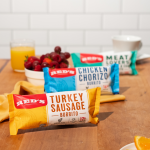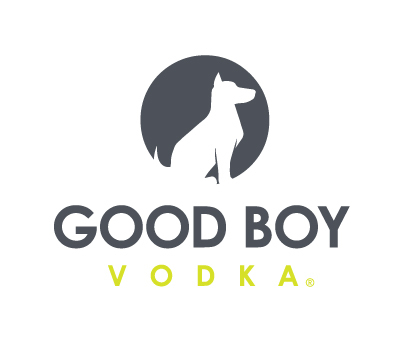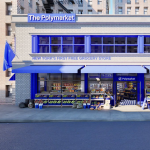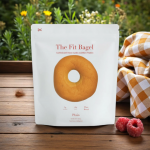Toronto-Based Happy Wolf Bulks Up U.S. Retail Presence With Whole Foods Launch
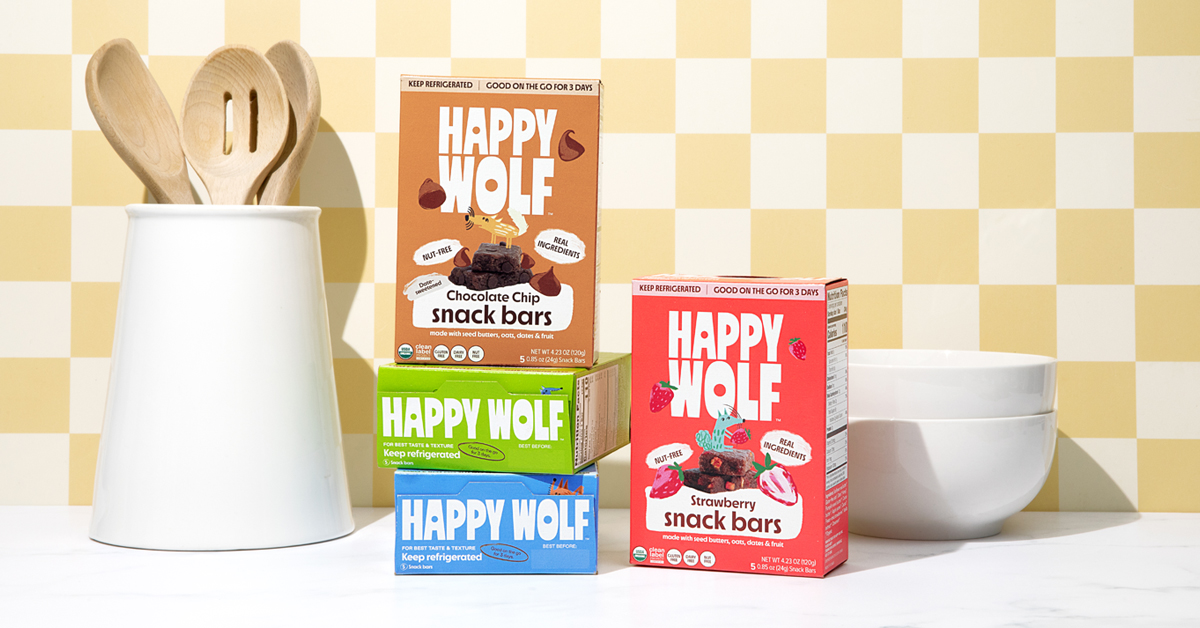
Canadian kids refrigerated bar startup Happy Wolf is expanding its retail presence in the U.S. with a new launch in Whole Foods Market stores up and down the East Coast, the Midwest and the Southwest. The new partnership brings the brand’s total nationwide door count from 120 to 450.
The natural retail chain will carry three SKUs – Strawberry, Chocolate Chip, and Choco Banana – that are priced at $8.99 per 5-count box. Each USDA-certified organic bar is crafted with seed butters, oats, dates and fruit and is free of refined sugar and artificial colors and preservatives.
“Whole Foods has always been the north star. When we were building this brand, we were thinking about the first big retailer that we would see ourselves in and we feel we’re aligned with [the Whole Foods] shopper,” said co-founder Jana Goodbaum.
Happy Wolf is Goodbaum’s first entrepreneurial venture following a career in consumer brand marketing, most recently serving as head of integrated marketing communications at Tim Horton’s. For the project, she partnered with Derek Beigleman – a friend of her husband – who founded and later sold pet food brand Open Farm.
Launched direct-to-consumer (DTC) in 2023, Happy Wolf set out to provide parents with a school-safe, convenient snack for their kids that “wasn’t just carbs and sugar.” Its lineup, which also includes an Apple Cinnamon variety, was created for consumers aged 18 months to eight years. The brand’s original intent wasn’t necessarily to launch in the refrigerated category, but doing so was necessary once it nailed down its core recipes.
“In order to not compromise on ingredients, we learned through R&D that we would have to keep [our products] in the fridge because it acts as a natural preservative. It allows us to use ingredients like sunflower seed butter and pumpkin seed butter as our core ingredients without them oxidizing and going bad,” said Goodbaum, noting that the bars have a six-month shelf life in the fridge and are good on the go for three days.
Due to the refrigeration requirement and use of clean label ingredients in its bars, Happy Wolf’s customers are paying a premium for its products. But, according to Goodbaum, that hasn’t been a deterrent for consumers. In fact, she said early adopters and brand champions see value in the convenience of Happy Wolf producing something that feels homemade.
The brand currently works with a co-manufacturer, though finding a partner that was aligned with Happy Wolf’s values was a difficult process.
“It was really hard to find someone who was willing to work with us [using] no processing aids, no emulsifiers, and no syrups. All of the ingredients that make manufacturing easier we weren’t willing to use,” said Goodbaum.
Generating Awareness
Beyond Whole Foods, Happy Wolf’s bars are available at retailers like Wegmans, Gelson’s, Erewhon, and Jimbo’s, among others. Additionally, the products can be purchased on the brand’s website for $19.99 per 2-pack of 5-count boxes.
Prior to landing in Wegmans, Happy Wolf had anticipated its first years in brick-and-mortar retail would be spent primarily in the natural channel. However, through its success in the conventional chain, the brand learned that “parents who are looking for cleaner ingredient decks are shopping at conventional stores as well,” shifting its retail approach.
According to Goodbaum, Happy Wolf decided to launch in the U.S. first because the refrigerated bar category is more developed here than in Canada. She pointed to a stateside “tidal wave” of refrigerated snack offerings crafted for kids and adults from brands like Once Upon a Farm (OUAF) and Perfect Bar.
“OUAF is really building in this category and educating parents to go to the fridge for best-in-class options for their kids,” said Goodbaum. “They don’t have much of a presence in Canada yet and, so, to be merchandised in their presence makes it a bit easier.”
Whereas Once Upon a Farm has established itself as a baby and toddler food brand, Happy Wolf is geared toward a slightly older consumer. Additionally, the Canadian brand believes it stands out in the saturated category for its use of honey and dates to sweeten its products. Kids eat, on average, four snacks a day and often seek diversity in what they’re eating, said Goodbaum, who believes kids snacks is “not a winner-takes-all category.”
According to market researcher Future Market Insights, the U.S. refrigerated snacks market is currently valued at $27.8 billion and is experiencing rapid growth as consumers increasingly seek healthier options.
Leveraging Goodbaum’s background in marketing, Happy Wolf has amassed an audience of over 14,000 followers on Instagram with behind-the-scenes videos of the co-founder and her experience as a mom building a business. According to the brand, the content has helped build a “small but mighty community.”
Happy Wolf will spend 2025 focused on executing product demonstrations while asking consumers to shift from shopping DTC to in-store following the Whole Foods launch. The brand has triangulated its best customers and mapped out those who live closest to a Whole Foods location, sending them personalized emails saying Happy Wolf would appreciate them switching to in-store purchases, as it’s hopefully easier for them in addition to being more eco-friendly (given the insulated ice packs required for online orders).
“It’s an experiment, but it’s something we’re really excited about. It also opens up one-on-one conversations with hundreds more customers, which is really exciting,” said Goodbaum.

